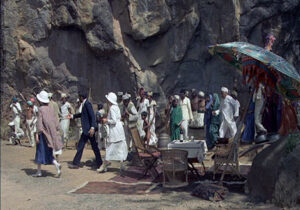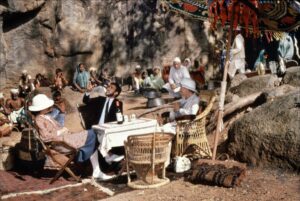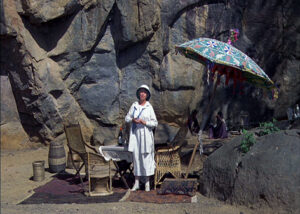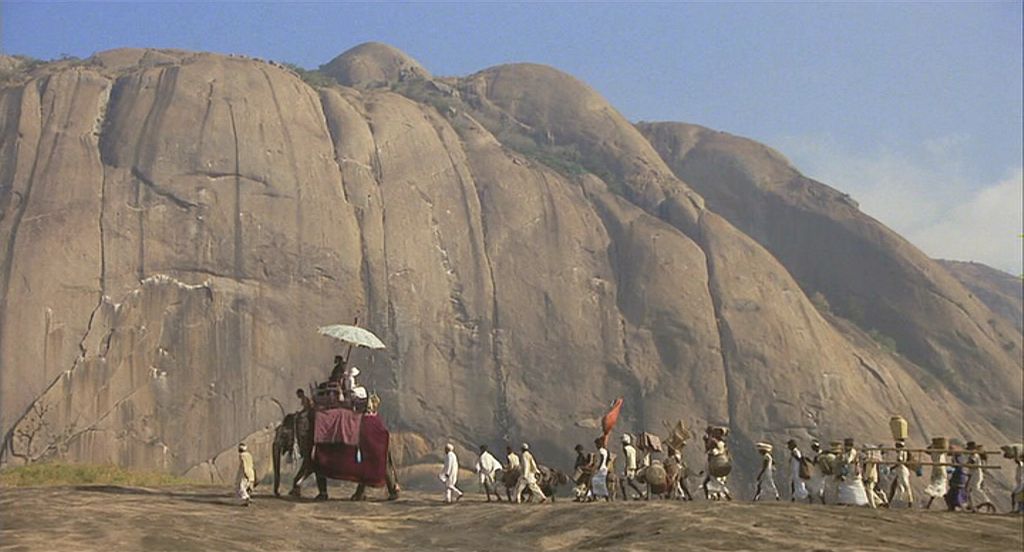 The Marabar Caves picnic is a metaphor for the irreconcilability of Anglo-Indian relationships. Lean’s careful version of the catastrophic “Caves” episode, like Forster’s, constitutes the middle third of A Passage to India.
The Marabar Caves picnic is a metaphor for the irreconcilability of Anglo-Indian relationships. Lean’s careful version of the catastrophic “Caves” episode, like Forster’s, constitutes the middle third of A Passage to India.
Dr. Aziz’s generous offer of friendship to Mrs. Moore and Adela Quested unintentionally widens the gap between Indians and the colonial British. “Let me invite you all to a picnic at the Marabar Caves,” Aziz says. “Ladies, this will be the most magnificent outing. One is transported by a mountain railway two thousand feet above the plain. And the caves, Mrs. Moore, are a wonder of India.”
Like Aziz, you expect a picnic to be perfect. But this picnic is a series of good intentions dashed. Aziz can scarcely afford the cost of the picnic but cannot back out without losing face. Mrs. Moore and Adela Quested cannot refuse without being condescending. Two other guests, Narayan Godbole and Richard Fielding miss the train.
The train from Chandrapore to the caves must leave before dawn to avoid the heat. Aziz sleeps at the station with his picnic supplies so he will not miss the train. Presuming that the English are only happy when they eat, Aziz prepares a breakfast of poached eggs in the train lavatory. It’s not unsanitary, but it is unappetizing.
The elephant taxi ride from the station to the caves is an expense Aziz can barely afford. It’s unappreciated, and Mrs. Moore is petrified. The caves, carved into the barren rock, are dark, fetid, and crowded with other visitors creating a booming reverberating echo.
Aziz is an uninformed guide. Moore and Quested are disappointed but cannot say so. Worse, voices echo and boom so loudly that Moore panics and abruptly rushes out.
Lunch is served under an umbrella at a table set with china, crystal, and a vase with artificial flowers. Aziz again provides poached eggs and toast, then mutton chops, toast, tea, and port for the ladies. Aziz is a Muslim and does not drink alcohol. When they finish dining, Moore firmly refuses to return to the caves. She fears the “boom,” the crowd, and the claustrophobic atmosphere. Dutifully, Quested accompanies her host, and it’s on this second visit that Aziz’s good intentions turn topsy-turvy. 

Aziz and Quested hold hands when approaching the caves but separate upon entering. Trying to make conversation, Quested asks Aziz if he loves his wife. Instead of answering that she is dead, he lies. Perturbed by his dishonesty, Aziz abruptly leaves Quested for a smoke. When he returns, Aziz calls for her, but instead of answering him, Quested panics and runs out of the cave and down the steep hillside, suffering numerous scratches and bruises. At the bottom, she fortuitously meets Mrs. Callendar, a friend from Chandrapore, who has thoughtfully driven Fielding to join the picnic.
Knowing he ought to be sure Quested is safe, Aziz instead returns to Mrs. Moore, who has been joined by his friend Fielding, and is evasive when Fielding asks, “But why did Miss Quested go off with Mrs. Callandar? Aziz replies, “I don’t know.”
Arriving in Chandrapore, Aziz is arrested without being informed of the charge and carted off to jail. Soon it’s revealed that Quested has been pressured into alleging that Aziz molested her. It’s untrue, but the Brits are (irrationally) eager to make a case to assert their power at any cost.
Aziz’s innocence is confirmed at the trial when Quested admits she lied. To the locals, he is a hero; to the Brits, she is a disgrace.
The cast: Judi Davis as Adela Quested; Peggy Ashcroft as Mrs. Moore; Victor Banerjee as Dr. Aziz Ahmed; Alec Guinness as Professor Narayan Godbole; James Fox as Richard Fielding
See David Lean. A Passage to India (1984). Screenplay by David Lean, based on E. M. Forster’s novel; E. M. Forster. A Passage to India. London /New York Edward Arnold/Harcourt Brace 1924; https://archive.org/details/APassageToIndia_109; Rau, Santha Rama. A Passage to India (New York: Harcourt, Brace & World, 1961); Lean’s screenplay is at https://cinephiliabeyond.org/a-passage-to-india-david-leans-rocky-road-to-creating-a-most-powerful-adaptation/

